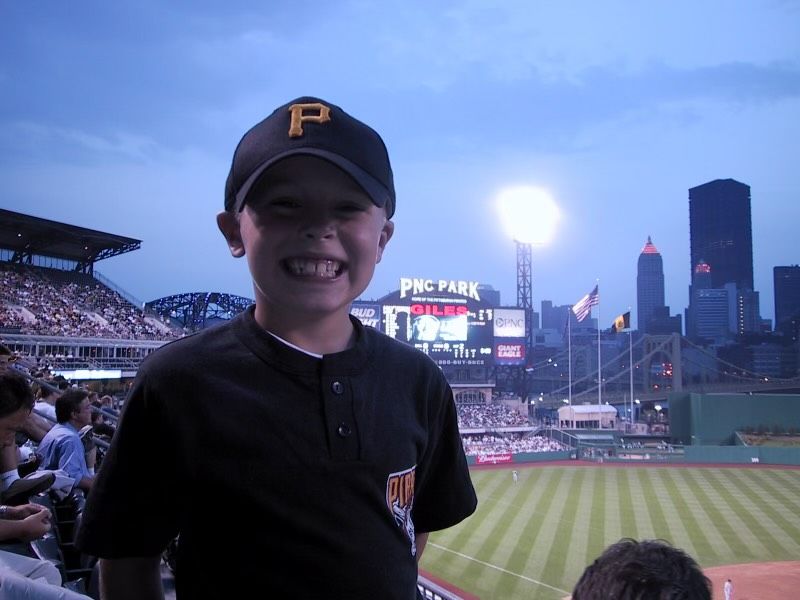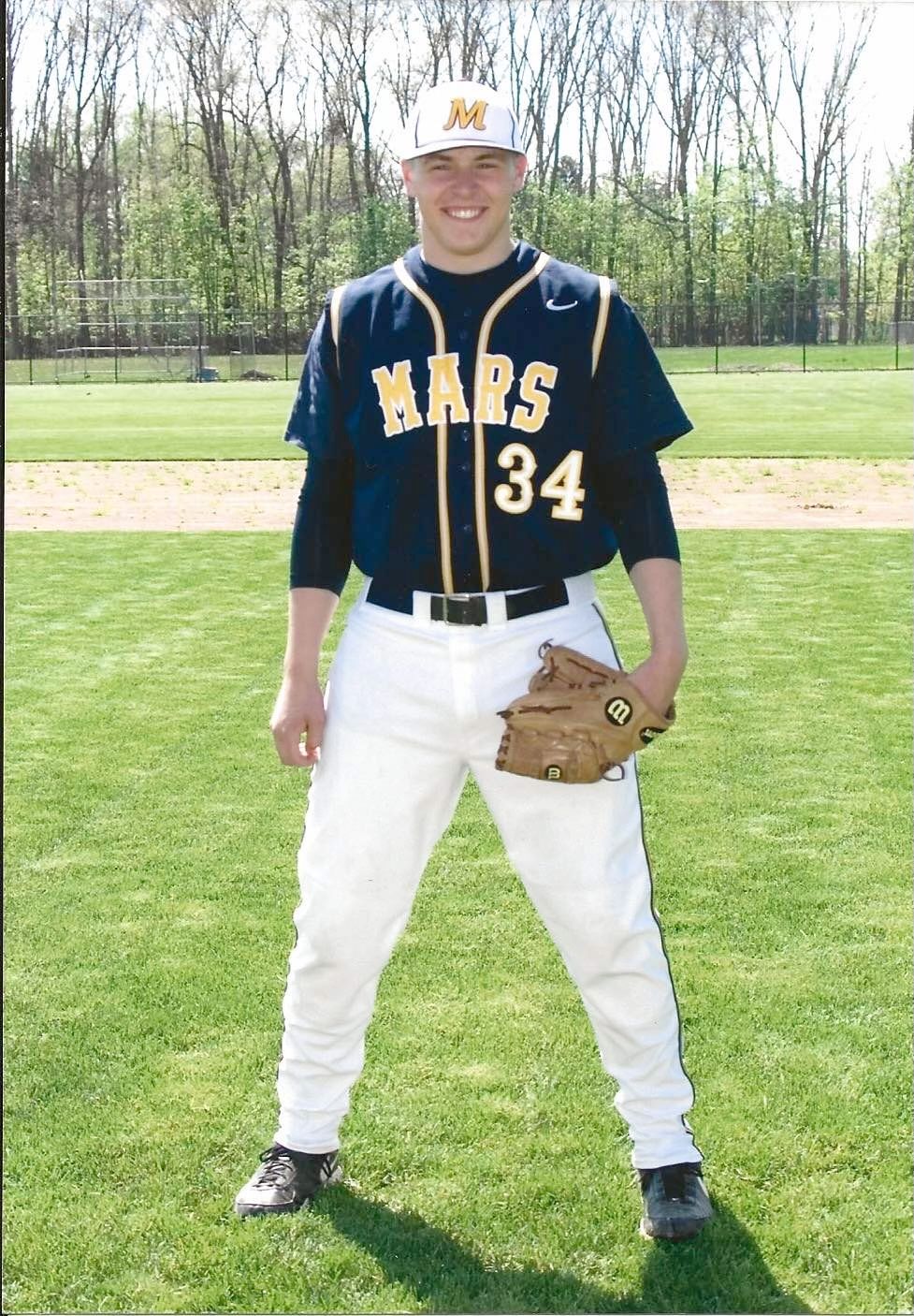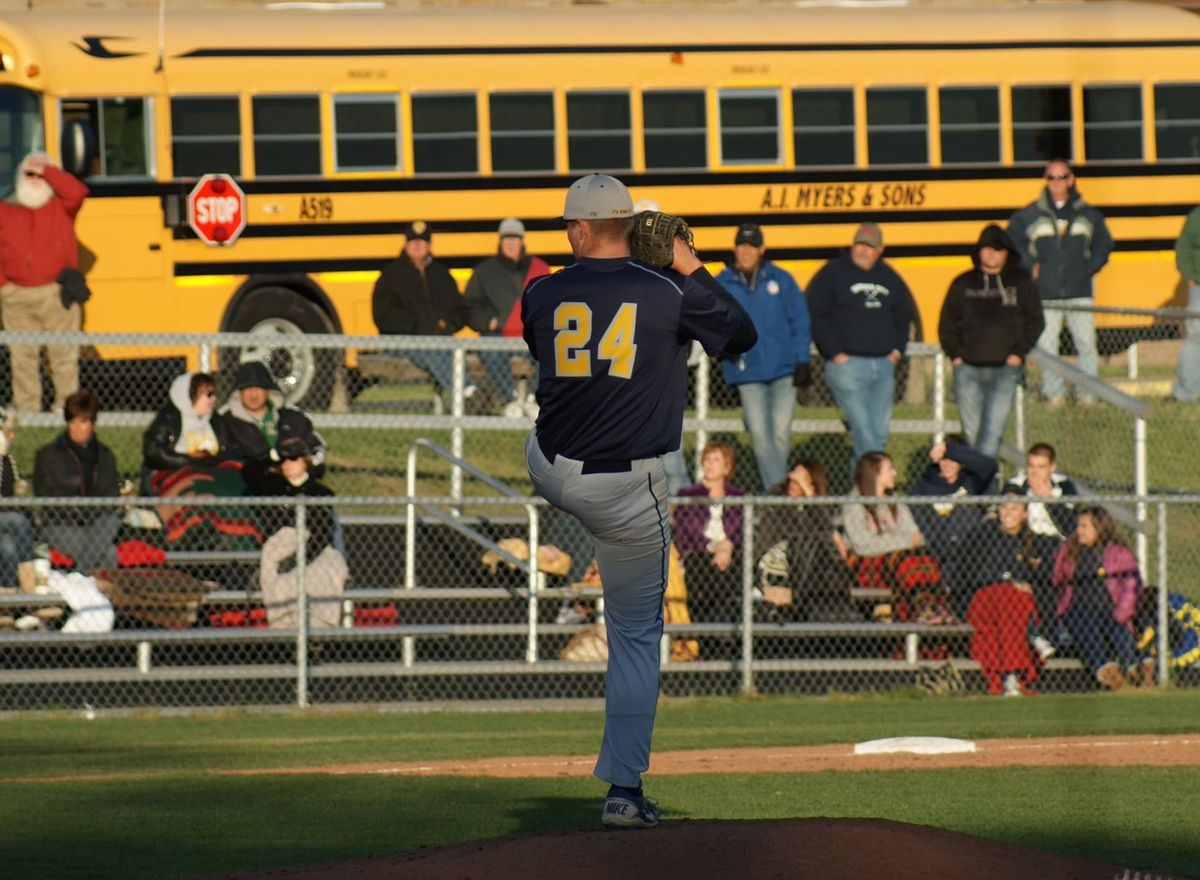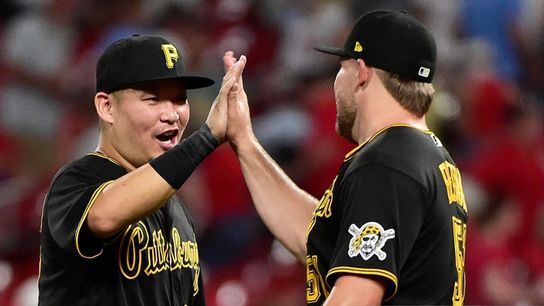Before he went outside to work, David Bednar made a quick detour.
It was a crisp November morning, and he would soon be participating in a Thanksgiving drive up event with the Pittsburgh professional sports teams. After parking in the stadium garage, rather than going straight outside, he took a peek at the field.
“Thought about maybe going to the hill, taking some BP,” he joked to me that day.
Bednar is very familiar with that field. Growing up in Mars, Pa., he was only about 25 miles north of the north shore of Pittsburgh and would frequent it with his family while growing up.
He was a PNC Park kid.
“I would always run around PNC and try to get a glimpse of the bullpen and see how hard those guys were throwing up close,” Bednar said during a recent phone call. “Just try to be a part of it.”
Growing up, he hoped to one day play on that field, even as a visitor. In 2021, he got to call it home after being traded from the Padres as part of a package of players for Joe Musgrove. That homecoming was one of the highlights of the Pirates’ season. While he was not the headliner of the deal, he was the first to make an immediate impact in the majors, going on to pitch to a 2.23 ERA and win the Steve Blass Pirates pitcher of the year award as a rookie.
That’s emblematic of Bednar’s playing career. He was never a top prospect. He was a 35th-round draft pick. The guy Division I schools liked, but not to the point that they would offer a scholarship. But he produced.
Before any of that, he was a Mars Fighting Planet and a Diamond Dawg. That’s where he went from a converted catcher to a future major-league pitcher. It didn’t happen with big velocity spikes or something flashy to grab the eyes. It was a grind.
“He did all the intangible things that other people didn’t do,” Brian Hobaugh, Bednar’s former coach at Mars, said. “He was one of the hardest working kids I’ve ever seen."

BEDNAR FAMILY
A young David Bednar, not camped out by the bullpen.
____________________
TOOLS OF IGNORANCE
There must have been something in the water in Mt. Lebanon in the mid-90s. How else do you explain three future professional athletes playing t-ball at the same time? There was Bednar, Cubs infielder/outfielder Ian Happ and Commanders defensive back Troy Apke playing in the same T-ball league.
“I just remember being in love with it at such an early age,” Bednar said. “Even when you’re forced to play all the positions. Outfield in t-ball, you don’t get much action. [I remember] sitting on the edge of the grass, trying to rub some dirt on my pants to make it look like I did something.”
In third grade, the Bednars moved up to “God’s country” in Mars, and David continued his baseball journey. He pitched some, but he was mostly a catcher.
“I grew up watching Jason Kendall,” he explained. “I thought catching was badass.”
A left-handed hitting catcher, no less. In an August game in Milwaukee this past season, Bednar actually got to show off that left-handed stance to his teammates when he was kept in to hit in extra innings. The dugout couldn’t believe it.
“We have the picture blown up and everything,” Andy Bednar, David’s father, said with a chuckle about that at-bat.
Andy, a former pitcher at Cornell, was David’s first coach. He and Hobaugh have each had stints as Mars’ coach, with the other staying on as an assistant. When Bednar joined the varsity team in Mars, Hobaugh was the one in charge, but Andy also took part in David’s travel ball team and development as a pitcher.
“At the time I took it with a grain of salt, but having my dad as a coach was awesome,” David said. “It’s a lot of memories to look back on and laugh. Even the car rides where if I went 0-for-3 and struck out looking three times.”
Andy was also able to help David and his younger brother, Will, off the field. Weight room, resistance band work, strength and conditioning, flexibility work…
“They did all the intangible things that other people didn’t do,” Hobaugh said, referring to Will as well. “They were the two hardest working kids I’ve ever seen.”
Gary Wilson, a longtime Hampton baseball coach, would spend his offseasons giving private instructions to kids in facilities around the Valencia area. David would come back home during the winter break from school and the summer and work out at these same facilities. Wilson made sure to point out what David was doing to show the student he was working with what it would take to get to the next level.
“Just watching him was impressive,” Wilson said.
While David’s improvement as a player was a slow grind, the Mars team immediately benefited from that work ethic and broke out of a funk to become one of the best teams in their section. In the three years before Bednar joined Varsity, Mars went a combined 22-36, never making the playoffs or finishing with a winning season. In his three years on the team, they went a combined 41-15 and made the playoffs each season.
“I can’t say it was all David,” Wilson said. “But I can say it was great.”
The first playoff game Bednar played would be impactful for the rest of his career. WPIAL rules allow teams to pinch-hit for pitchers and catchers without needing to take them out of the game, ensuring that they have enough time to warm up. In the late innings with a runner in scoring position against Hopewell, Hobaugh opted to take advantage of that rule even though David was ready to enter the game. It was a lefty-on-lefty matchup, and he had a right-handed hitter on the bench.
“I just had a gut feeling that kid was going to produce for us,” Hobaugh said.
He didn’t. He struck out, and Mars lost.
“I still get joked about that,” Hobaugh said.
“He’s kind of pissed at me to this day,” Andy joked.
Time heals all wounds, but that day, David left the field wondering one thing.
What are we doing here?
“It is right then I realized that I need to figure it out as a hitter, or maybe pitching is the route for me,” David said.
Obviously, he went with the latter.
-original.jpg)
BEDNAR FAMILY
David Bednar at the bat.
____________________
A DIAMOND DAWG
In the fall of 1985, Pitt pitcher Frank Merigliano was asked to give a tour to a potential recruit. It went well, but Andy Bednar told the Panthers thanks, but no thanks.
“He ultimately decided to go to Cornell instead, so he must not have had much fun on his recruiting weekend,” Merigliano said. “That wasn’t my fault.”
Merigliano would continue with Pitt and was drafted by the White Sox in the 16th round in 1988. He pitched six years in their farm system and rose all the way up to Class AAA, but arm injuries cut his career short and kept him out of the majors.
About 10 years after hanging it up as a player, the Diamond Dawgs were born. There are two main objectives for the travel ball team. The first is teaching these teenagers how to become ball players, mentally and biomechanically. Across the country, more and more high schoolers and teenagers are suffering arm injuries earlier because they are selling out for velocity rather than good mechanics. Merigliano had four surgeries as a player for the same reason. He learned the hard way what not to do.
The second is traveling across the country in order to generate some buzz around their players. Their travel plans for this upcoming year includes Indianapolis, Georgia and New Jersey.
“It’s a big world, and you have to get your kids in front of the people who are recruiting them,” Merigliano said.
In the 19 years since the program started, 270 of their players went on to receive college scholarships and nine played in the majors, including Bednar.
Starting around when David was 12, Andy decided it was time for David to get another coaching source and find a travel ball team. After bumping into Merigliano on a field, the Bednars gave the Diamond Dawgs a chance, and it clicked.
“One of the things about Frank is he’s going to tell it to you straight,” Bednar said. “He’s not going to sugarcoat it. If you’re ready for a certain level or a certain jump, you believe him because he’s not going to bull**** you.”
One of those messages after that sophomore year was that it was probably time to focus on pitching, which included getting more reps on the mound while on the travel circuit. Merigliano liked that David went straight after hitters and had that high level of competitiveness. It set him apart despite not having the most velocity in the league.
“It was just consistency, all the time,” Merigliano said. “When he was on the mound, you had a pretty good chance to win the game. We don’t keep records or stats, but I don’t remember a game where he got torched… It was always something different. When he was on the mound, you knew you had a chance.”
“He stuck out that summer,” Andy said. “It was a no-brainer that it was time to give up the tools of ignorance and get on the bump.”
David noticed the change too, and credited it to how Merigliano ran the team and camps.
“Looking back, you see that all of the qualities that they try to instill in everybody, mainly being a good baseball player, good teammate and how to compete,” David said. “I think it’s one of those things that went the farthest with me. Whatever happens, happens, but you’re going to do it balls out and you’re going to compete.”
That mentality carried over into the next season. This time, David was the staff ace, and he quickly established himself as a pitcher to watch by no-hitting Hampton in his first start of section play, though his high school buddies will remind him it was only possible because of a couple good catches in the outfield.
Wilson, who has been involved with the program since 1997, can’t remember another time Hampton was no-hit. He sat out that year because his son was in college. According to him, “it wouldn’t have been a no-hitter if I was coaching. If I was there, it would have been a one-hitter!”
“I can respect that,” David said in response.
Being a pitcher first was suiting David, and the prospective engineering student was looking to further his career in college. So why weren’t the recruiting offers coming in?

BEDNAR FAMILY
David Bednar, Fighting Planet.
____________________
‘VELOCITY, VELOCITY, VELOCITY’
Before he became Mars’ baseball coach, Hobaugh was a pitcher himself, spending two years in the Twins’ farm system after pitching for Iowa. He thought his alma mater would be a good fit for David and that he could handle Big 10 baseball.
The Bednars sent a recruitment video to the Hawkeyes, and the team got back to Hobaugh. They liked what they saw, but they couldn’t offer him a scholarship.
Why?
“Everyone wants velocity, velocity, velocity,” Merigliano said.
In 2021, Bednar threw the five hardest thrown pitches of any Pirates pitcher, maxing out at 99.6 mph. (He relented that even though the stadium radar guns classified that as triple digits, it doesn’t count.) But back when he was going through the recruitment process, he sat mostly in the mid-80s. Most Division I schools looked for about 90 mph for scholarship athletes. While some pitchers do enjoy a big spike year in velocity to help get them there, Bednar’s journey was gradual. A mph here, a mph there. It was a steady path, but he was behind other recruits.
“It’s a progression,” Merigliano said. “The body needs time to adjust to velocity. You have to grow into it.”
But with a finite number of scholarships, colleges don’t usually give those positions to players who could maybe one day grow into velocity. There are normally three games played a week in college ball. Innings are valuable, and projectable pitchers are risky.
“Could he have pitched at Pitt?” Andy asked. “Absolutely he could have, but he wasn’t lighting up the radar guns at an early age like they wanted to see.”
Younger brother Will had that extra velocity and much more demand for his collegiate services. After helping Mississippi State win a national title last season, he went on to be drafted in the first round by the Giants.
“Oh my God, life is better when you throw hard!” David joked, comparing their two recruitment stories.
David wasn’t being completely ignored. Cornell and the University of Buffalo showed some interest, as did some Division II schools like Seton Hill and Mercyhurst. But there were more nos than yeses from the Division I schools that could put him in position for a major-league career.
“A lot of rejection, but it helped put a chip on my shoulder. ‘You don’t throw hard enough.’ Prove those guys wrong.”
On the other side of the state, Lafayette College looked like a good fit, but they only had two scholarships available all year. They were considering David, but also liked another pitcher who applied for an Ivy League school. They have a reputation of waiting a long time before accepting or rejecting an applicant. If they rejected the player, Lafayette was the fallback and the scholarships would be taken.
That player did get into the Ivy League school, leaving one scholarship available. Lafayette manager Joe Kinney made the trip out to the western part of the state for a bullpen. Because of logistics, it would take place on the Hampton mound that Bednar threw his no-hitter. Merigliano caught.
It went as well as they could have hoped. Kinney was impressed and offered David the scholarship spot there. He accepted.
A no-hitter and a great college audition on the rival’s mound? “I’m not giving them too much credit,” David said, cutting off the question chuckling.
Bednar started to occasionally hit 90 his senior year, of course after the college search was finally done. That extra speed gradually rose throughout college and in the minors, and he continued to establish himself as one of the WPIAL’s best pitchers in his final high school season, too. But he had competition.

BEDNAR FAMILY
David Bednar pitches in his final WPIAL game against Blackhawk in 2013.
____________________
ONE NIGHT IN NORTH ALLEGHENY
Bednar was arguably the top senior in WPIAL his final year of high school ball, but Blackhawk pitcher Brendan McKay was the most hyped prospect in the area at the time. The two-way phenom would go on to play at Louisville two years later and then be selected fourth overall in the 2017 draft by the Rays.
The two played in the fall with the Allegheny Pirates, a local fall ball All-Star team. In 2013, he and Bednar had a couple matchups on the diamond.
Mars got the better of McKay in a non-section game during the regular season, with Bednar driving in a pivotal RBI on what he called an “ass out, lazy line drive that was barely fair.”
“So count it,” David said. After that game, McKay went weeks without allowing another earned run.
Round two had higher stakes. Blackhawk was the defending WPIAL champion. Mars earned a bye from the play-in round because of their section record. They wound up facing each other in the first round.
Going to North Allegheny on the uncharacteristically cool mid-May evening, the stadium lights turned on. North Allegheny may have some of the best high school facilities in the area, but it’s still not as bright as PNC Park or a collegiate field.
“Oh my God, is anyone going to even touch the ball?,” Hobaugh thought. “It’s hard enough to face these guys in broad daylight.”
It turns out Hobaugh was right.
“I remember there weren’t a lot of balls hit,” Blackhawk pitching coach Joe Boyer said.
“If you went to get a candy bar, you missed the inning,” Hobaugh said.
“Of course we run right into the buzzsaw,” David said.
Both McKay and Bednar traded punches for the opening innings, with Bednar legging out an infield single in the second. (“Blazing speed, I guess,” was his explanation.) Bednar also was dominant on the mound, fanning the first six hitters he faced.
“We knew how good he was,” Boyer said. “When he was catching, we told Andy to keep him back there. We don’t want to see him on the mound against us.”
Playing at night may have been what ended up costing Mars in the end. Blackhawk scrapped out two runs on an errant pickoff throw and a misplayed fly ball in left. Bednar’s single was the only hit McKay allowed.
Blackhawk wound up winning, 2-0. Bednar finished with a dozen strikeouts. McKay fanned 16.
“You look back on it and think, ‘that would have been a good WPIAL championship game,’ ” Hobaugh said.
After the game, Bednar was consoled by a church family friend, who offered him and a teammate his seats for the next Pirates home game. It was Steelers' general manager Kevin Colbert.
The tickets were a nice consolation prize. What David really took from that game was more confidence ahead of his jump to the collegiate level.
“Pitching against a guy of that caliber and hanging in there, it gave me a lot of confidence on the pitching side.”

GETTY
David Bednar celebrates his first big league save in August.
____________________
‘A REGULAR GUY’
In those first home games of last season, the Bednars would hear the same thing from the parents and families of the other Pirates players: You guys are so lucky to live so close to where David is playing.
After making those trips out west to watch him play in the Padres’ farm system, it certainly is easier.
“We got a little bit nonchalant about it,” Andy joked. “Get there in the fifth inning on Sundays because we knew he wasn’t going to pitch until the sixth or seventh, if not later.”
“Believe me, I know we’re lucky.”
David knows he’s lucky too. He dreamed of being in this spot one day. Now the guy who was hanging out by the bullpen watching the relievers has kids hounding him for baseballs and autographs.
They get them, plus usually some chit-chat with the big leaguer. What grade are they in? What position do they play?
“It’s always a little kid in a Diamond Dawgs jersey or a kid Mars shirt,” David said. “It never gets old. It’s honestly the best part. I was very much one of those kids.”
Those kids with the Diamond Dawgs still see David, Andy and Will throughout the offseason. Usually to train or show up with pizzas. They don’t get the celebrity treatment there. They’ve been going there for years and are just one of the guys.
“It’s blue collar, through and through,” Merigliano said. “There’s no celebrity. There’s no entitlement. And he’ll always be that way. He’s a regular guy who happens to be really good at throwing baseballs.”

